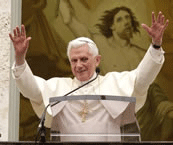ANGELUS
H.H. Benedict XVI
"On the Cleansing of the Temple"
March 11, 2012
www.zenit.org
Dear brothers and sisters!
The Gospel of this third Sunday of Lent refers – in the account given by John – to the celebrated episode in which Jesus casts the animal merchants and money changers out of the temple of Jerusalem (cf. John 2:13-25). The event, reported by all of the evangelists, occurs around the time of the feast of Passover and leaves a tremendous impression on both the crowds and the disciples. How should we interpret this gesture of Jesus? First of all it must be noted that it does not provoke any response from the guardians of public order because it was seen as a typical prophetic action: the prophets, in fact, in the name of God, often denounced abuses and sometimes they did this with symbolic acts. If there is a problem, it is their authority. This is why the Jews asked Jesus: “What sign do you give us to do these things?” (John 2:18). Show us that you truly act in God’s name.
The casting of the merchants out of the temple has also been interpreted in a political and revolutionary way, connecting Jesus to the movement of the zealots. They were “zealous” for God’s law and ready to use violence to make it respected. In Jesus’ time they were awaiting a Messiah that would liberate Israel from Roman rule. But Jesus disappointed this hope, so much so that some disciples abandoned him and Judas Iscariot betrayed him. In reality, it is impossible to interpret Jesus as violent: violence is against the Kingdom of God, it is an instrument of the antichrist. Violence never serves humanity, but dehumanizes. Let us hear Jesus’ words as he performs this deed: “Take these things away and do not make my Father’s house into a marketplace!” And the disciples recall that in a Psalm it is written: “I am consumed by zeal for your house” (69:10). This Psalm is a plea for help in a situation of extreme danger when one is at the mercy of his enemies’ hatred: the situation that Jesus will face in the passion. The zeal for the Father and his house will lead him to the cross: his is a zeal of love that he will pay for personally, not a zeal that serves God through violence. In fact, the “sign” that Jesus will give will be precisely his death and resurrection. “Destroy this temple,” he says, “and in three days I will raise it up.” And St. John observes: “He was speaking of the temple of his body” (John 2:20-21). With Easter Jesus initiates a new form of worship, the worship performed by love, and a new temple which he is himself, the risen Christ, through whom every believer can worship God “in spirit and truth” (John 4:23).
Dear friends, the Holy Spirit began building this temple in the womb of the Virgin Mary. By her intercession, we pray that every Christian may become a living stone in this spiritual edifice.
[Following the Angelus, the Holy Father spoke to the faithful in various languages. In Italian he said:]
Dear brothers and sisters,
My thoughts are above all with the dear people of Madagascar, who have recently been struck by natural calamities, with grave damage being done to persons, buildings and crops. While I assure my prayers for the victims and the families who have been severely tried, I hope for and encourage the generous assistance of the international community.
[In English he said:]
I greet the English-speaking visitors present for this Angelus prayer, including the Neo-catechumenal Community from Bristol. In today’s Gospel Jesus foretells his resurrection and points to the temple which is his body, the Church. May our meditation on these mysteries deepen our union with the Lord and his Church. Upon all of you I invoke God’s blessings!
[Concluding in Italian, he said:]
I wish everyone a good Sunday and a good week. Thanks and have a good Sunday.
[Translation by Joseph G. Trabbic]
| H.H. Benedict XVI-Angelus |

